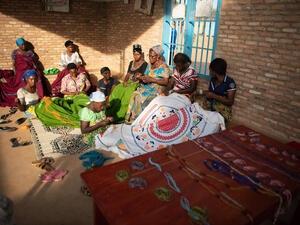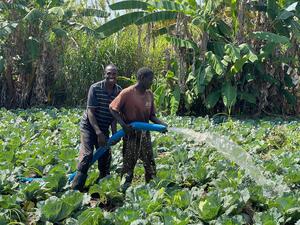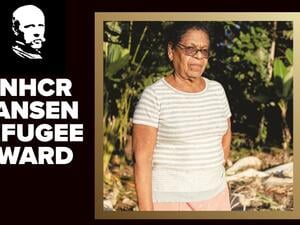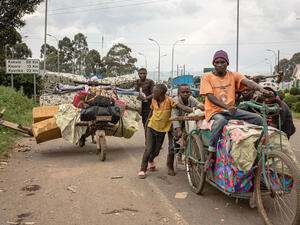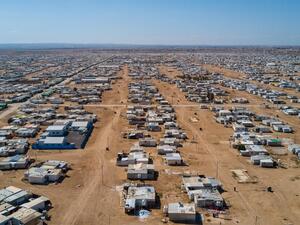Afghan ceramists sweeten the pot in Balochistan
Afghan ceramists sweeten the pot in Balochistan
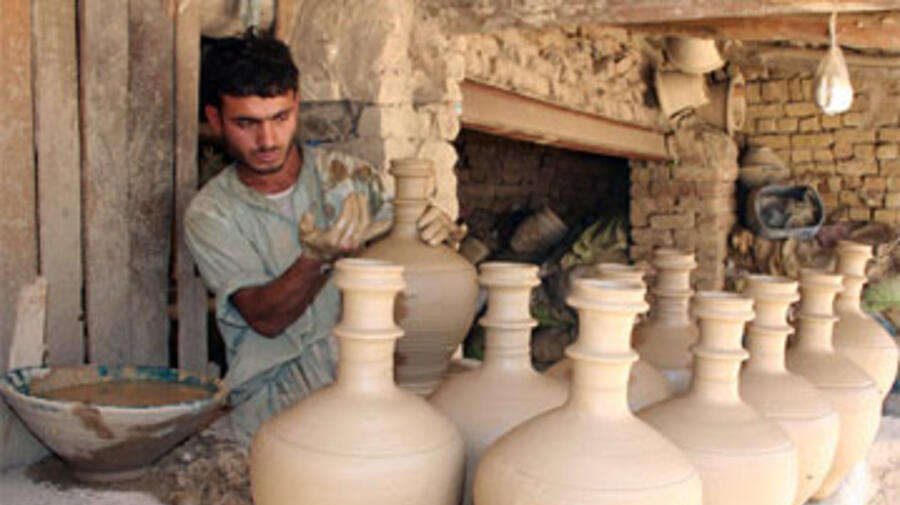
Afghan potter Haji Muhammad at his workshop in Quetta, south-western Pakistan.
QUETTA, Pakistan, August 13 (UNHCR) - With a foot on the kick-wheel and his hands around a mound of spinning clay, Abdul Salam churns out pots with manual precision. The fact that he can do it within minutes without any measuring device speaks volumes about his adroit artisanship. The 45-year-old Afghan potter from Kandahar has been associated with the pottery business for the past 22 years in Quetta, the provincial capital of Balochistan in south-western Pakistan.
Located at the eastern edge of the Iranian plateau, Balochistan shares a border with Iran to the west and with Afghanistan to the north and thus offers a diverse fusion of cultures and crafts to visitors. The arrival of Afghan refugees since the late 1970s has added more colours to the already distinctive local handicraft industry.
Afghans run 10 pottery workshops in Quetta city and export their pots to other districts of the province. "When we first came to Pakistan, we were empty-handed and were not expecting to stay here for that long," said Salam's relative Haji Muhammad, a 25-year-old potter. "But thank God we brought with us this skill that is earning us our daily bread."
This potter family is one of the few fortunate Afghans with marketable skills to support themselves. According to the 2006-7 registration report, out of the total 2.1 million registered Afghans, only 1 percent is associated with businesses while many are daily wage labourers.
Afghan potters in Balochistan produce pottery mostly for domestic use, including pitchers for cooling water, soup bowls, pots for home décor, mud-ovens (tandoor) for nan bread baking, and flowerpots.
Salam is happy with his limited resources and mass production. He makes over 200 pots a day and earns Rs. 10,000 (over US$140) a month. All his designs and measuring are in his eyes and mind. It comes instinctively to him, and he struggles when asked for details on his daily output and the exact weight of earth used for each pot.
His cousin Sheir Aghah does the kneading. He manually grinds and kneads the clay into the right consistency, a long and tiring process. Then comes Salam's turn to mould, glaze and bake the pots as per formula. The freshly-made ceramics are dried in the open air before designs are etched on them. A liquid made from red mountain stone is applied to the dried pots before they are ready for glazing. The glazed pots are then baked for three days in a traditional kiln that is heated by firewood. A pot takes approximately seven days to be ready for sale.
Salam argues that if he replaces the wood with gas to fire the kiln, he would not get the desired results. "My pots need moderate and slow heating because the clay in Balochistan is harder compared to that of Punjab and Sindh, it therefore requires more time in the kiln for fine finishing. I heat the kiln for 12 hours prior to the baking and then leave the pots there for three days. The pots would crack if baked in a highly-heated gas kiln."
In a world where markets are thronged by low-priced plastic, steel and glass products for domestic use, pottery is less a necessity and more of an artform that should be conserved and developed.
Salam believes that despite the technology boom and industrial revolution, nothing can substitute the thousand-year-old craft of pottery. "Development never brings only good, it always brings along troubles in the form of lethal pollution and ailments, and then every problem gives birth to a hundred others," he said.
His cousin Sheir Aghah added, "As long as human beings live, our business will survive. Because for the poor, our pots are a necessity and for the rich it's a luxury that beautifies their houses."
Guenet Guebre-Christos, who heads the UN refugee agency in Pakistan, noted that in return for nearly 30 years of refuge, Afghan refugees have offered their skills to Pakistan in industries like carpet weaving, agriculture and handicrafts. She suggested, "To bolster the country's economy with the revenue generated by Afghan artisans and labourers, Afghans in Pakistan should be made part of the system and their services should be regularized to let the profit reach local markets."
By Duniya Aslam Khan in Quetta, Pakistan


